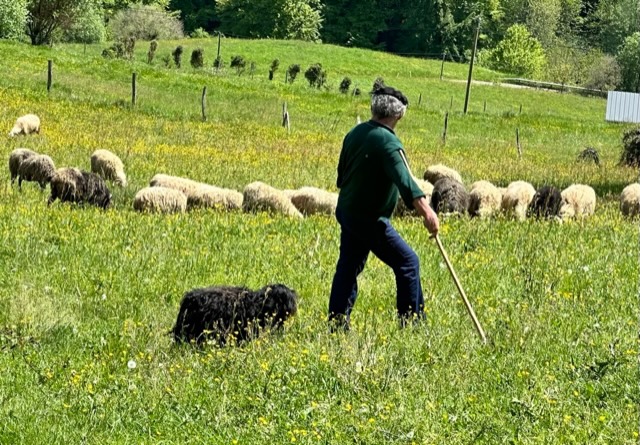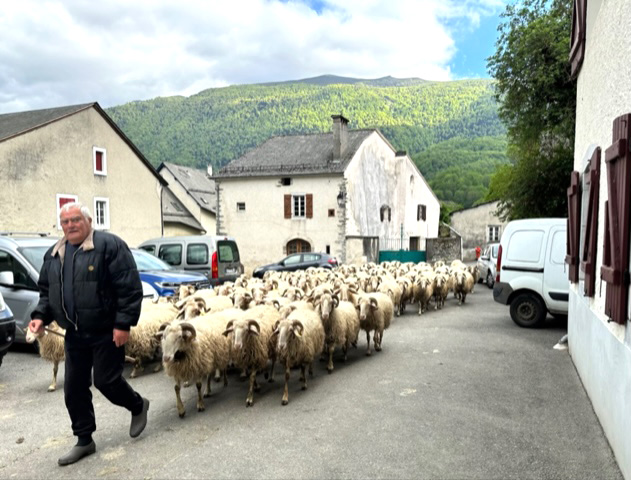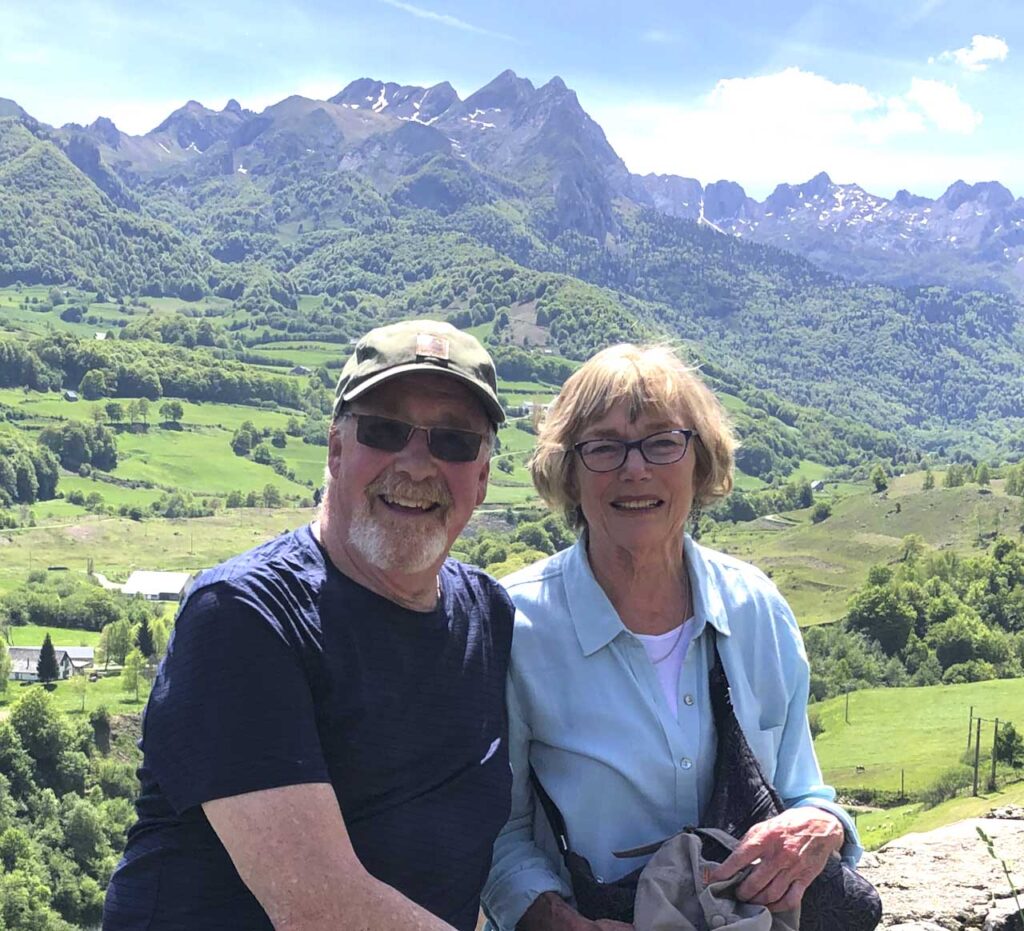Dates: 1944–
Role at the AFLCR: Served as board member from 1998; worked on Quebec Culture, the student exchange program between students in Burlington and Saint-Jean-sur-Richelieu; organized exchanges between high schools in Vermont and France.
Tim Kahn grew up in Sonoma California, the son of Albert E. Kahn, a noted peace activist, investigative journalist, political radical, and internationally known author, and Riette Kahn. Tim came to Vermont to attend Middlebury College, where he earned his BA as well as a master’s degree in French language, literature, and culture.
Basques and Bearnais
He had traveled abroad in 1964 to spend his undergraduate junior year at the University of Bordeaux. Prior to the start of those classes, he spent two months in an intensive French-language immersion program in Pau, a town at the foot of the Pyrénées Mountains. There, thanks to his French host family, he spent time among the Béarnais and Basque peoples. He was stuck by their sense of community and traditional village lifeways, so distinct from the mainstream European world.
Kahn was especially fascinated by the Basques’ and Béarnais’ longstanding sheepherding culture. During his time there, he got to know the culture and developed personal relationships with individuals. Tim told his father about his experiences, hoping Albert would write about them. Albert made plans to travel there, to create a photo essay, but the project was aborted when he died in a car accident in 1979.
Teaching and touring
Meanwhile Tim, after graduating from Middlebury, stayed in Vermont with his wife, Fran, and raised a family. He taught French at South Burlington High School. He would chair the K-12 World Language Department for 35 years.
At South Burlington High School, Tim set up a student exchange program with a high school in France, called the International Experience (TIE). Forty-five years later, that program continues to arrange student exchanges today.
In 1988 Tim co-founded Educational Travel Service (ETS) to lead custom tours of for small groups of travelers seeking cultural engagement and direct contact with local people. It too is still going strong, as part of Champlain Tours. ETS groups have visited Southeast Asia, South Africa, France and Italy, Australia and New Zealand.
Basques in the American West
Over all these years of work and family, Tim stayed in touch with his beloved Pyrénées friends. He learned that starting in the late 19th century, the Bearnais-Basque culture had experienced economic stress, and that many young people had emigrated to North and South America.
He learned of a professor at the University of Pau who had been tracing early-1900s emigration to the United States. The professor invited Tim to help him research the history of Basque settlement American West. He accepted. Tim and Fran traveled to the U.S. West to seek out Basque Americans. There they discovered many, who told them their stories of immigration in interviews. He even found Basque Americans in his own hometown of Sonoma.
Tim and Fran were eager to meet an American Basque who was still practicing the ancestral sheepherding prevalent in the Pyrénées.. Given the difficult economics of sheepherding in the United States, such individuals were uncommon. But finally they came across Pete Camino, a Wyoming Basque whose family had emigrated to the Big Horn Mountains in the early 1900s. Pete, at 83, was still sheepherding. While growing up in Wyoming, he told them, he’d hear stories of the old country. His love for the rugged Rockies, they noticed, paralleled his ancestors’ love of the Pyrénées.
But Pete was having a hard time continuing as a sheepherder, as new farming techniques and economic concentration were threatening to destroy sheepherding altogether. Pete’s cousin, Johnny, had already given up, sold his herd, and become a bar owner.
The Last Link
Around 2000, Tim had an idea. He called his son Ben, who had recently graduated from Middlebury with a degree in film, and suggested they produce a film about Basque sheepherders in Wyoming. Ben agreed. In October 2001, father and son traveled to the Big Horns, where they filmed Pete running his ranch the way his forefathers had done and bringing his sheep down from the mountains.
During one four-day trail ride, Pete mentioned to the Kahns that he had long cherished a dream: “to see my Basque homeland in the Pyrénées and meet my Basque relatives before I die.” He had never been there. “I looked at Ben,” Tim recalled, “and later that night we agreed. Here was our story.” The duo decided to make a documentary about the last Basque sheepherder in Wyoming encountering his roots in a Pyrénées village.
After much preparation, filming got under way, and they brought Pete to the Pyrénées. As he met his Basque relatives for the first time, Ben filmed the joyful reunion. This homecoming became the centerpiece of the film, The Last Link, amid affirmations of community and calls for the preservation of traditional lifeways. The documentary ends with Willie Nelson, the narrator, asking, “What stand are we willing to take to preserve for the future the roots of our past?” Released in 2003, The Last Link was broadcast on the Basque educational channel, on France 3 and 5, and other European networks; on PBS in the United States, and in Francophone Africa.
The Next Link
Tim Kahn then decided to bring the film’s core message home to Vermont. He founded an educational initiative called The Next Link: Building Sustainable Communities, to teach educators and community leaders how to guide young people to preserve cultural history, the environment, and vintage agricultural lifeways. The initiative helped give rise to Common Roots in the South Burlington School District, a movement that, according to its website, “connects farmers, educators, youth, and community members to build a sustainable future through food and land stewardship education. By collectively growing food for our programs and food shelves, we celebrate the soil and the soul of community. Our regenerative farming practices provide food and soil security nurturing our common roots.”
Tim’s story of Pyrénées sheepherders, then, led led to local action here. He recalls an afternoon when he was sitting on a mountainside in the Col d’Aubisque with Joseph Anglagrais, an eighty-something sheepherder. As they looked out over the valleys, Joseph said, “La terre, la bonne eau, et le bon air. These are the three most precious elements in the world.” Today Common Roots teaches young people about the value of protecting the land, the water, and the air. It is a road map for generations to come.
Tim’s son Ben is currently developing a TV miniseries that focuses on the role that Pyrénées sheepherders played during World War II in helping French refugees flee the Nazi occupation.
Thanks to Tim Kahn for conversations about his experiences for this profile.
Janet Biehl


